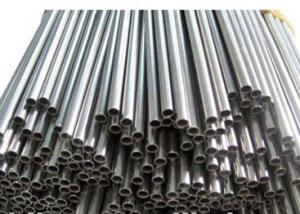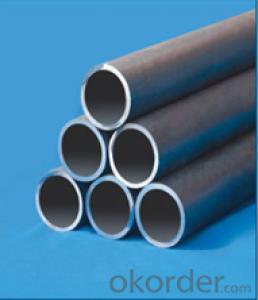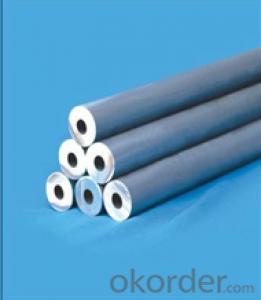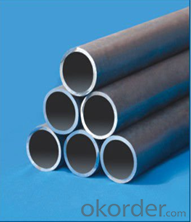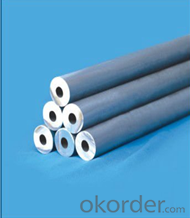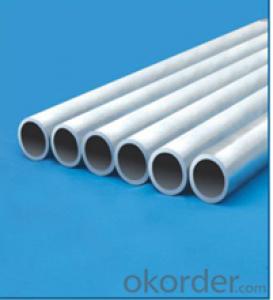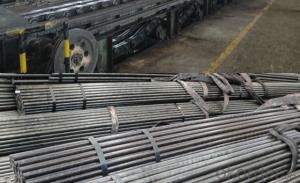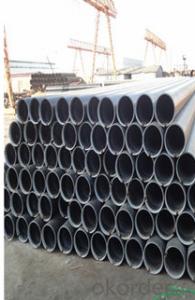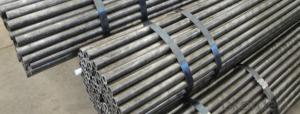Seamless HARD Carbon Steel Pipe&Tube For Tunnel And Anchor Rod 16MN CNBM
- Loading Port:
- Qingdao
- Payment Terms:
- TT OR LC
- Min Order Qty:
- 10 pc
- Supply Capability:
- 30 pc/month
OKorder Service Pledge
OKorder Financial Service
You Might Also Like
Quick Details
| Thickness: | 1 - 14 mm | Section Shape: | Round | Outer Diameter: | 8 - 80 mm |
| Place of Origin: | HEB,HEB,HEB,China,FORM A,FORM E China (Mainland) Ch China (Mainland) | Secondary Or Not: | Non-secondary | Application: | Hydraulic Pipe |
| Technique: | Cold Rolled | Certification: | ISO9001:2008 | Surface Treatment: | oil |
| Special Pipe: | Thick Wall Pipe | Alloy Or Not: | Is Alloy | length: | 5-8m |
| usage3: | machine bush parts | usage4: | machine and engine pin | usage5: | tunnel and anchor rod |
| Test: | eddy current test,Ultrasonic Testing | usage2: | shock absorption bush | usage1: | power transmission machinery |
| colour: | black | name: | large-diameter hot-expanding seamless steel pipe | Grade: | 10#,20#,45#,16Mn,16Mo,16mo3,Q345,ST35,St37,ST37.4,St52,10#-45#,Mo,Q195-Q345,ST35-ST52 |
| Standard: | ANSI A210-1996,ASTM A1020-2002,ASTM A213-2001,ASTM A403-2007,ASTM A789-2001,BS 1387,BS EN10296,DIN 17175,DIN EN 10025,DIN EN 10217-1-2005,GB/T8162,GB/T8163,JIS G3459-2004,JIS G3461-2005,ASTM,BS,DIN,GB,JIS |
Packaging & Delivery
| Packaging Detail: | Marking: as per customer's requests. Painting varnish coating on the pipe. steel trips, woven bag |
| Delivery Detail: | 10-45 days or as the customer's request |
Seamless Carbon Hard Steel Pipe&Tube For Tunnel And Anchor Rod
Type | Manufacture & Sales OEM | |
Process | Seamless, Cold drawn and Cold rolled, finish-rolled | |
Material | 20#, 10#, 45#, 35# , Q345, 16Mn, 42CrMo | |
size | Outer Diameter | 8 –80mm |
Wall Thickness | 1-14mm | |
Length | 5-10m | |
Standard
| DIN st42, st45, st35, st37 and st52, GB 8162 | |
Package | 1. Bundle packing. 2. Bevelled end or plain end or warnished as per buyer's requestments. 3. Marking: as per customer's requests. 4. Painting varnish coating on the pipe. 5. Plastic caps at ends. | |
Delivery Time | 15to20 days or as clients reqestments | |
- Q: What are the different types of hangers used for supporting steel pipes?
- There are several different types of hangers used for supporting steel pipes, including clevis hangers, riser clamps, U-bolts, beam clamps, and pipe rollers. Clevis hangers have a clevis-shaped bracket that attaches to the pipe and can be suspended from a beam or threaded rod. Riser clamps are used to support vertical pipes and are typically attached to a wall or structural member. U-bolts are used to secure pipes to beams or other structural elements. Beam clamps are designed to attach to overhead beams and provide support for the pipe. Pipe rollers are used to support pipes on horizontal surfaces and allow for easy movement or rotation.
- Q: What are the different testing methods for steel pipes?
- Some of the different testing methods for steel pipes include visual inspection, ultrasonic testing, magnetic particle testing, radiographic testing, and hydrostatic testing.
- Q: What are the different types of steel pipe coatings for underground gas pipelines?
- There are several types of steel pipe coatings used for underground gas pipelines, including fusion bonded epoxy (FBE) coating, three-layer polyethylene (3LPE) coating, and three-layer polypropylene (3LPP) coating. These coatings provide protection against corrosion, abrasion, and other external factors, ensuring the longevity and safety of the gas pipelines.
- Q: How are steel pipes protected during transportation and storage?
- Steel pipes are usually protected during transportation and storage through various measures such as coating them with anti-corrosion materials, wrapping them with protective films or tapes, using wooden crates or pallets for stacking and securing them with straps or bands. Additionally, pipes are often stored in covered or climate-controlled warehouses to prevent exposure to moisture and other potential damaging elements.
- Q: Heating system DN40 and DN32 welded steel pipe how to connect?
- Welding: AC arc welding machine welding. Mode 1: apply to the medium of non demanding piping, DN40 steel pipe necking and DN32 steel pipe butt welding, or directly DN32 steel pipe into the DN40 internal welding. 2: the pipeline requirements apply to the inner wall of smooth transition, reducing short circuit welding for DN40x32 suppression of this mechanism are used for connection pipe seamless steel pipe high pressure pipeline connection, no special requirements, not commonly used welded steel pipe. Connection of mechanism fittings is not only costly, but not necessary unless special requirements are required!
- Q: What is the maximum bending radius for steel pipes?
- The maximum bending radius for steel pipes is determined by several factors, including the diameter of the pipe, the thickness of its walls, and the specific type of steel used. In general, pipes with larger diameters and thicker walls will have a greater maximum bending radius. However, it is crucial to adhere to industry standards and guidelines to ensure that the structural integrity of the pipe remains intact during the bending process. To obtain precise details regarding the maximum bending radius for steel pipes in various applications, it is recommended to consult the manufacturer's specifications or refer to relevant codes and standards, such as the American Society of Mechanical Engineers (ASME) B31.1 or B31.3.
- Q: What are the different types of pipe connections used with steel pipes?
- There are several types of pipe connections commonly used with steel pipes. Some of the most common types include: 1. Threaded connections: These connections involve threading the ends of the pipe and using threaded fittings to connect them. This type of connection is typically used for smaller diameter pipes and is easy to install and dismantle. 2. Welded connections: Welding is a common method used to connect steel pipes. It involves joining the ends of the pipes together by melting the metal and fusing them together. Welded connections are durable and strong, making them suitable for high-pressure applications. 3. Flanged connections: Flanges are used to connect pipes by bolting them together. Flanged connections are commonly used in industrial applications and are often used for larger diameter pipes or when the pipe needs to be easily disassembled for maintenance purposes. 4. Grooved connections: Grooved connections involve using grooved fittings that have grooves on the inside to connect the pipes. These connections are often used in fire protection systems and are quick and easy to install. 5. Compression connections: Compression fittings are used to connect steel pipes by compressing a ferrule onto the pipe. This type of connection is commonly used in plumbing applications and provides a tight and secure seal. 6. Mechanical connections: Mechanical connections, such as couplings or clamps, are used to connect steel pipes without the need for welding or threading. These connections are often used for temporary or emergency repairs. Each type of pipe connection has its advantages and disadvantages, and the choice of connection method will depend on factors such as the application, pipe size, and installation requirements. It is important to carefully consider these factors to ensure a secure and reliable connection for steel pipes.
- Q: What are the different types of joints used to connect steel pipes?
- There are several types of joints commonly used to connect steel pipes, including threaded joints, welded joints, flanged joints, and grooved joints.
- Q: How are steel tubes represented?
- If you speak of steel pipe, if it is water. Gas transmission pipe, then it is said: nominal diameter refers to the inner diameter. The units are millimeters or inches. [for example, water pipes with phi 25. It means that the nominal diameter (diameter) is 25mm (or an inch) steel pipe.
- Q: What's the use of steel pipe?
- No other type of steel can replace the steel tube entirely, but the steel tube can take the place of some sections and bars. Steel pipe is very important to the development of national economy and the improvement of human life quality, much better than other steel products. From the people's daily utensils, furniture, water supply and drainage, gas supply, ventilation and heating facilities to all kinds of agricultural machinery equipment manufacturing, underground resources development, national defense and space use guns, bullets, missiles, rockets and so cannot do without steel.
Send your message to us
Seamless HARD Carbon Steel Pipe&Tube For Tunnel And Anchor Rod 16MN CNBM
- Loading Port:
- Qingdao
- Payment Terms:
- TT OR LC
- Min Order Qty:
- 10 pc
- Supply Capability:
- 30 pc/month
OKorder Service Pledge
OKorder Financial Service
Similar products
Hot products
Hot Searches
Related keywords
